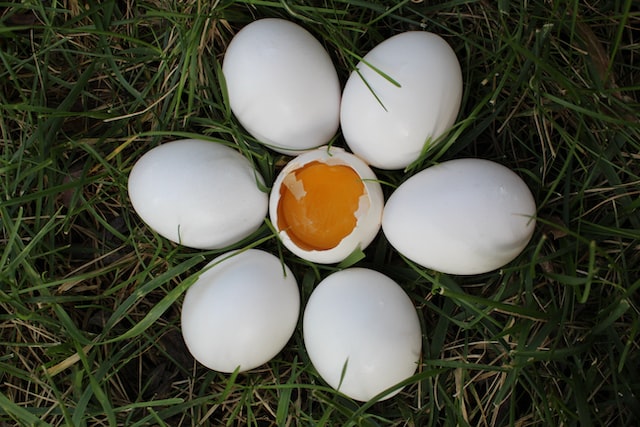Introduction – Dispose Of Old Eggs
Eggs stored outside of the refrigerator are safe for consumption for up to five weeks after purchase, but how to dispose of old eggs? If you find yourself with a large number of spoiled eggs that should not be consumed, you can get rid of them in several different ways or recycle them.

First Check If The Egg Has Gone Bad
It is important to check the quality of your eggs before using them. One easy way to do this is by smelling each egg before cracking it open.
If you detect a strong, unpleasant smell, then the egg has likely gone bad and should be disposed of immediately.
As we already warned, cracked eggs should not be consumed as bacteria can enter through the cracks. We’re extra safe so even hairline cracks worry us and cause us to throw away the eggs.
Hairline cracks in eggs are usually caused by the eggshell weakening due to age, temperature changes, or improper handling.
It is possible for a hairline crack to occur while the egg is still inside the chicken, but it is more likely to happen after the egg has been laid.
Hairline cracks can cause bacteria to enter the egg and can cause the egg to spoil more quickly. To prevent hairline cracks, store eggs in a cool, dry place and handle them carefully.

Second, Consider These Ways To Dispose Of Old Eggs
If you have eggs that need to be properly disposed of, there are several ways in which you can do so. You can simply throw out the expired eggs, especially rotten ones, in the trash or compost bin.
Alternatively, if you have access to a local farm or animal shelter, many will accept your old eggs for their livestock feed or other purposes.
Some local recycling centers may accept old eggs to make fertilizer or other products. No matter how you dispose of old eggs, they should not be eaten to avoid contamination or food-borne illness.
1. Safe And Odorless Disposal Of Old Eggs: A Double-Bagging Approach
Discarding old or rotten eggs can often lead to concerns related to safety, odor, disposal methods, and waste management. Here’s a simple, unified approach to handle all these issues:
- Gather Necessary Materials: For this method, you’ll need a small plastic bag (like a grocery bag or smaller trash bag), your main garbage bag, and some absorbent material (like paper towels or old newspapers).
- Prepare the Eggs: Before you discard the eggs, wrap each one individually in an absorbent material. This step is crucial to absorb any potential leaks and to contain the foul odor that might emanate if the eggs break.
- Double Bagging: Place the wrapped eggs into the smaller plastic bag. Make sure to seal this bag by tying it off or using a bag tie. This will keep the eggs contained and minimize the chance of eggshells puncturing the bag.
- Final Disposal: Now, place the smaller bag containing the eggs into your main garbage bag. Proceed to discard your trash as you usually would.
2. Other Methods Of Dealing With Old Eggs
- Composting: By far the best option, composting old eggs is an environmentally-friendly way of disposing of them because they contain valuable nutrients that can help fertilize plants and soil. To properly dispose of old eggs through composting, break them into pieces and mix them with other organic matter such as plant clippings, leaves, and grass clippings. Cover the compost pile with a tarp or other material to ensure that it stays moist. We gave advice on starting your own compost pile. If you don’t have one, take it to a friend who has one!
- Animal Feed: Many local farms, shelters, and animal rescues will accept old eggs for livestock feed or other uses. This is an ideal way to get rid of old eggs while also helping out animals in need. We’re not recommending anyone to use rotten eggs because that would be dangerous to the animals. And even for eggs that are old but not past their expiration date should be cooked to get rid of bacteria.
- Recycling Centers: Contact your local recycling center to see if they accept old eggs for recycling purposes. Some centers may be able to use them as fertilizer or utilize them in other ways that reduce waste and help the environment.
- Turn Them Into Fertilizer: The eggshell is rich in calcium, a vital nutrient for many plants, and the inner part of the egg contains nitrogen, phosphorous, and other nutrients. Below is a simple method to use old eggs as fertilizer.
Remember, when disposing of old eggs it is important to do so in a manner that reduces waste and minimizes environmental impact. Taking these simple steps will help ensure that your old eggs are handled in an environmentally responsible way.
3. Turning Old Eggs Into Fertilizer
Yes, old eggs can be used to make organic fertilizer. Here is a step-by-step method.
- Crush the eggshells: Rinse the eggshells to remove any egg residue, then let them dry. Once dry, crush them into small pieces or powder. The smaller the pieces, the faster they will break down in the soil.
- Add the inner part of the egg: You can either mix this with the eggshells or apply it directly to the soil. Be aware, however, that raw egg can smell as it decomposes, and it may attract pests. Cooking the egg first can help to reduce this issue.
- Mix into compost or soil: You can add the crushed eggshells and egg directly to your compost pile, or mix them into the soil in your garden. If you’re adding them directly to the soil, it’s usually best to do so a few weeks or months before you plan to plant, as it will take some time for the egg materials to break down and become available to plants.
- Water your plants: As with any fertilizer, it’s important to water your plants after applying the egg mixture. This helps to start the decomposition process and makes the nutrients available to the plants.
What To Do With Expired Eggs?
Even while there is a possibility that some of the eggs that have beyond their expiration date are still edible, it is still in your best interest to avoid consuming them.
Even though eggs that have passed their expiration date may still contain some nutrients, it is best to dispose of them after conducting an inspection.
Crack It
To determine whether or not an egg can still be used, simply crack it open in a bowl or cup before making your determination. It should resemble an egg in both appearance and aroma.
Throw aside the egg immediately if you discover any pink, green, or other unusually colored contents within it. These hues point to the presence of a bacterial illness.
By doing this test, you may spot rotten eggs in your refrigerator and remove them before they contaminate other components.
After inspecting the eggs, you can utilize them as plant fertilizer in your garden bed or compost pile.
Calcium, present in eggs, is needed for plant growth, especially edible fruits and vegetables. They leach calcium into the soil, allowing root absorption and reducing blossom end rot.
Sniff It Out
If you’re comfortable using stale eggs on your body, give them a sniff. When they don’t have an unpleasant odor, combine them with yogurt or fruits for your hair or skincare routine.
If the eggs do not have an off-putting odor or color, you should be able to utilize them in the preparation of a meal for your pets, including your feline or canine offspring.
Eggs, similar to how they are for humans, can be a good source of nutrition for them. When the rotten eggs smell and look right, mix them with a little milk to make a smooth mixture.
Freeze Them
After that, you can put the mixture into ice cube trays and allow it to freeze.
Be sure to lightly grease the ice tray before using it so that the ice cubes may be removed more easily.
Egg proteins are a fantastic adhesive, and egg cubes include these proteins. You can use them to produce paper, bullet patches, and even paint (egg tempera).
Simply make sure that the ingredients are thoroughly combined by blending them.
Make use of ice cube trays with a huge capacity, like the Glacio Ice Cube Trays. Because a large tray’s wells are designed to accommodate a single giant egg, you will always have the appropriate quantity of eggs on hand when following a recipe.
Simply allow the cubes to thaw at room temperature before incorporating them into the mixture.
You can cook and freeze eggs because they don’t spoil. You can bake, fry, scramble, or boil eggs and then freeze them.
Unfortunately, hard-boiled eggs cannot be frozen successfully. Because of the temperature, they get a little bit mushy; thus, you should avoid freezing them.
What Happens If You Eat Old Eggs?

Even when eggs are fresh, there is a small chance of sufficient salmonella bacteria to make you ill.
Therefore, if you consume eggs that are past their expiration date, you may be at greater risk of food poisoning or other health complications.
Eating spoiled eggs is really bad and can result in nausea and vomiting, as well as diarrhea, fever, and abdominal pain. Salmonella is caused by a form of bacterium found in rotten eggs.
Therefore it is best to avoid consuming expired eggs altogether for your safety and well-being. However, we have good news on that front.
Salmonella in eggs has been an issue of public health concern since the early 1900s. In the United States, the first reported cases of salmonellosis due to eggs was in 1907.
Since then, numerous outbreaks of salmonellosis due to eggs have been reported in the United States and other countries.
The FDA has implemented various measures to reduce the risk of salmonella in eggs, including requirements for safe handling and refrigeration, pasteurization of liquid eggs, and labeling of eggs that are not from certified salmonella-free flocks.
In addition to these measures, the FDA has also developed a Salmonella Enteritidis (SE) control program as part of its egg safety rule, which requires egg producers to test for SE and take steps to reduce the risk of SE contamination.
The FDA also recommends that consumers cook eggs thoroughly and purchase eggs only from approved sources.
Egg’s Standard Shelf Life
Eggs can stay fresh for up to three to five weeks when stored in the refrigerator. The source of this information is the USDA web page on storing eggs in the refrigerator.
Once you cook them, ironically, you want to keep them only a week as with other cooked food. Most certainly get rid of eggs that have cracks in them.
Even after being kept in a storage facility for an extended period, many are still fit for human consumption. When you pick them up from the aisle, the vast majority of eggs have already been laid for three weeks.
Final Thoughts
Old eggs should always be disposed of responsibly to avoid contamination and food-borne illnesses.
You can choose to compost, feed them to animals, recycle them at local centers, or throw them in the trash. Eggs with foul odors or discoloration may be spoiled and should not be eaten.
Overall, by following these simple tips you can help ensure that your old eggs are handled safely and in an environmentally friendly manner.
Moreover, taking extra caution when dealing with expired eggs will prevent any health complications from occurring due to their consumption.
